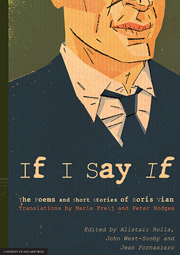Book contents
- Frontmatter
- Contents
- Foreword
- Boris Vian: A Life in Paradox
- Note on the Texts
- Part I The Poetry of Boris Vian
- Part II The Short Stories of Boris Vian
- Part III On Translating Boris Vian
- On Not Wanting to Die: Translation as Resurrection
- Determining a Strategy for the Translation of Boris Vian
- Notes to the Poems
- Notes to the Short Stories
- Bibliography of Works Cited
Determining a Strategy for the Translation of Boris Vian
from Part III - On Translating Boris Vian
Published online by Cambridge University Press: 05 September 2014
- Frontmatter
- Contents
- Foreword
- Boris Vian: A Life in Paradox
- Note on the Texts
- Part I The Poetry of Boris Vian
- Part II The Short Stories of Boris Vian
- Part III On Translating Boris Vian
- On Not Wanting to Die: Translation as Resurrection
- Determining a Strategy for the Translation of Boris Vian
- Notes to the Poems
- Notes to the Short Stories
- Bibliography of Works Cited
Summary
An author such as Boris Vian, who is renowned for his non-conformism, poses a set of problems for the translator that are rarely encountered in the work of any one single author. François Roulmann has indeed described Vian as an “anarchist when it comes to writing”, an author who is “so creative that he is difficult to categorise”. Nevertheless, numerous academic studies have sought to put order into this apparent disorder. His creative use of language has attracted particular attention. As Marina Yaguello noted in her article of 1984, “Vian's word plays have been listed and classified for some time: neologisms, use of polysemy and homophones, puns, syntactical ambiguity, metaphors”. Ten years earlier, Lydie Jeannette Haenlin had produced a systematic study of Vian's literary language, inspired by the work of the Liège School of rhétorique générale. This group of linguists developed a system in which linguistic operations were considered in terms of five categories:
Metagraphs: alterations at the level of spelling, which affect acronyms, foreign expressions and syntagmas.
Metaplasms: alterations at the level of morphology, which are found in allophones, phonemes, morphemes, lexemes and syntagmas.
Metataxes: alterations at the syntactic level, which are found in archaic poetry or in anglicised or popular syntax.
Metasememes: alterations at the semantic level, in metaphors and similes.
Metalogisms: alterations at the level of logic and referentiality.
Information
- Type
- Chapter
- Information
- If I Say IfThe Poems and Short Stories of Boris Vian, pp. 307 - 322Publisher: The University of Adelaide PressPrint publication year: 2014
